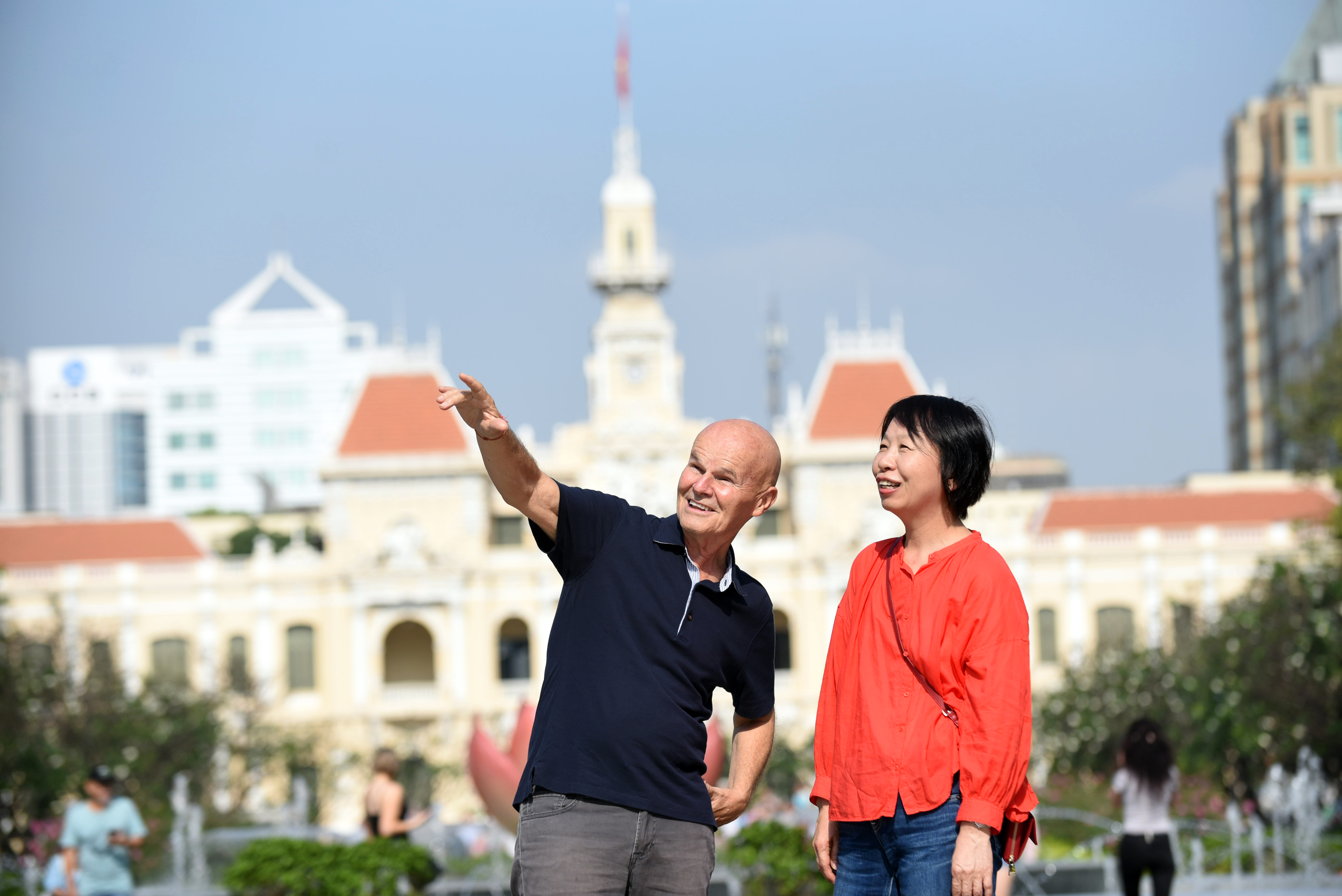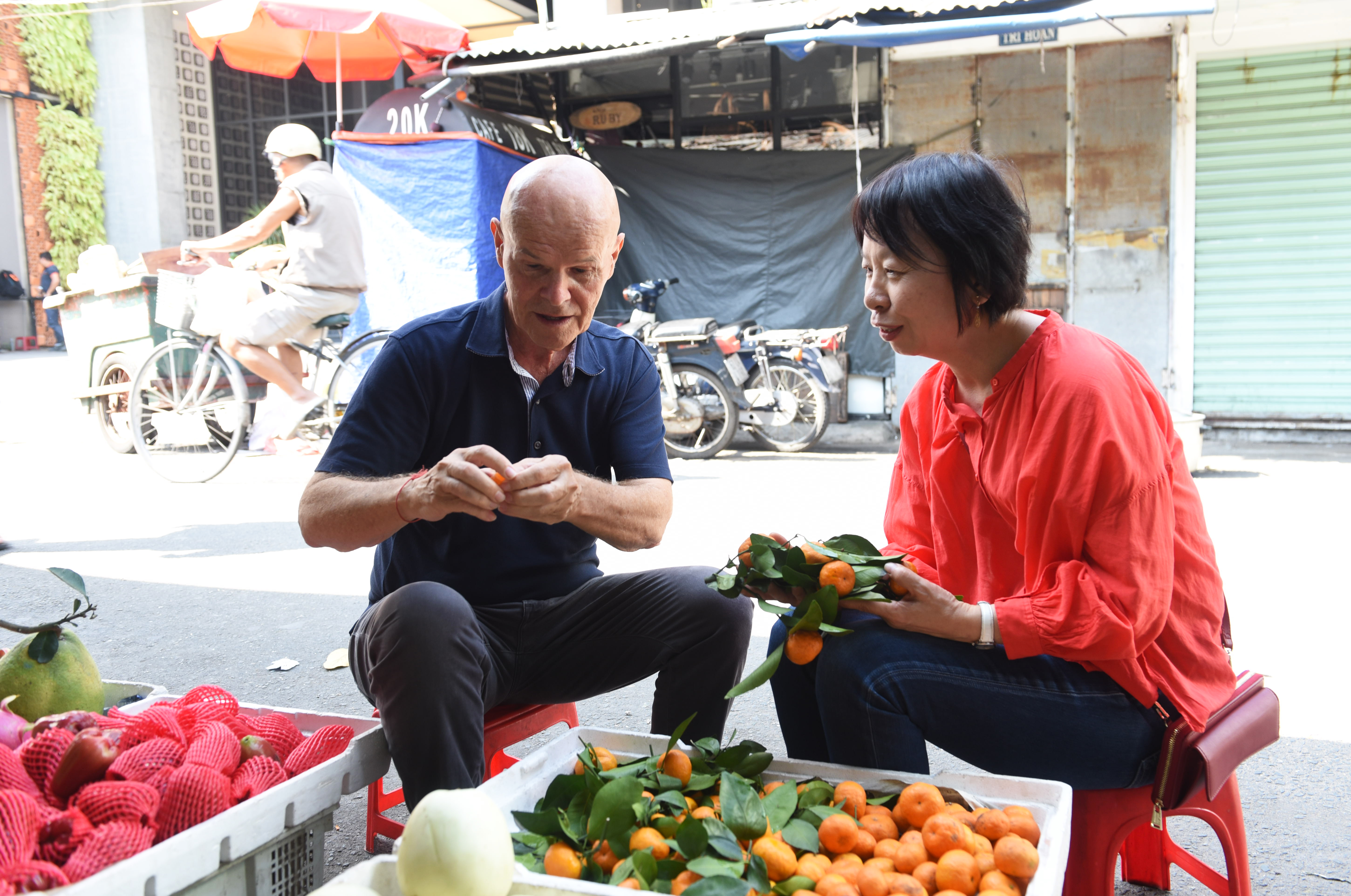While the cost of living is rising in countries around the globe, many retirees are looking far away from home for places they can afford to retire both happily and healthily.
Vietnam seems to have emerged as a top choice thanks to its friendly living environment, low cost of living, delicious food, affordable healthcare, and beautiful landscapes.
L. Dennis Woolbright, a U.S. national, is one of these retirees.
After spending the first four decades of his life in America, Woolbright decided it was time for a change.
He earned a master’s degree and moved halfway around the world to begin a new life as a teacher in Japan.
“I thought I would stay for just one year and then go back, but I enjoyed Asia so much that I've stayed for 36 years!” Woolbright said.
He is now married to a Japanese woman with whom he has two children.
Just a few years ago, he decided it was time to retire after a 30-year career as a university teacher.
But instead of going back to America, he chose to ask for his wife’s 'permission' to move to Vietnam and continue teaching English in the Mekong Delta province of Tra Vinh.
Though his wife stayed in Japan, Woolbright seems happy with the move.
“People are very friendly and it is cheap to live here,” Woolbright, now 74, explained, adding that “the thing I love most is that I feel needed because I love helping people.”
|
|
| American retiree L. Dennis Woolbright and his Japanese wife stop by a fruit shop at a wet market in District 1, Ho Chi Minh City on December 31, 2019, during her trip to Vietnam to visit her husband who moved to the country alone two years ago. Photo: Tuoi Tre/ Duyen Phan |
'My home city now'
German retiree Herby Neubacher has lived in the coastal city of Nha Trang for the past 19 years.
In an email exchange with Tuoi Tre (Youth) newspaper, he called Nha Trang “my home city now."
Neubacher's first visit to Vietnam was in 2000, when he was asked to deliver a presentation at a conference on the German seafood industry and the EU Commission’s legislative policies regarding the use of antibiotics in fish and seafood.
Though his first visit lasted only a few days, the city made such a grand impression on him that he decided to apply for a job with the Vietnam branch of SIPPO Group, an organization which promotes sustainable trade.
“[Nha Trang] has changed a lot since then. This former small city of fishermen has become a tourist hub, but I am still happy to live here,” he said.
Despite having officially retired, Neubacher occasionally provides consulting for seafood companies which specialize in pangasius.
For Neubacher, living and working in Vietnam has given him the opportunity to live a life he considers to be independent and free.
“Even as a European I’ve always felt welcomed and accepted here. The Vietnamese are interested to learn about other cultures as much as I like to learn about their culture,” he said, adding that “even though I can’t properly speak Vietnamese, I’ve never had a problem with the Vietnamese people around me.”
“Also, as a 70-year-old man, it’s quite important to me that the healthcare system is far better than talked and rumored about,” Neubacher described the “wonderful care” he received at the Military Hospital in Nha Trang after suffering a stroke last year.
According to the German retiree, Vietnam has become a truly cosmopolitan country where people from all over the world can feel at home, even if they only come for a short holiday.
"It would fill a book to list all the friendship and help I experienced in Vietnam, not to mention the healthy food that keeps me young and the nice weather and open sea I enjoy every day in my life," he added some things that have kept him in Vietnam for so long.
"And last but not least, the love of my wife who always does the best for me."
|
|
| German retiree Herby Neubacher, who is living in the coastal city of Nha Trang in Vietnam is seen in a photo he provided Tuoi Tre News |
A demand for retirement visas
Canadian Rick Ellis, 62, has lived for more than 40 years in many countries around the world, including 11 years in Southeast Asia.
According to Ellis, of all the countries he has lived in, Vietnam is the friendliest.
Ellis estimates the number of expat retirees in Vietnam to be over 100,000, with many of them still working or running their own businesses.
However, as Vietnam has no official retirement visa available, it is hard to pinpoint an exact number.
Southeast Asian countries are "competing” with each other to attract “proper” retired foreigners, Ellis said, explaining that those with stable incomes, no criminal records, and no history of participating in activities related to political or social instability are generally welcomed to countries throughout the region with open arms.
Countries like Thailand, Malaysia, the Philippines and Indonesia have already been trying to draw in these "desirable" expats with retirement visa schemes which require a demonstration of financial ability to prove that the retiree will not become a burden on the locality in which he or she lives.
Thailand, for example, requires retirees to prove they earn US$2,200 a month in order to qualify for a retirement visa while that number falls to $2,000 in Malaysia, $1,500 in Indonesia, and $800 in the Philippines.
According to Ellis, $800 is probably the most realistic number for Vietnam to require should it impose such a scheme due to the country’s comparable cost of living with the Philippines.
However, money is not everything.
What is more important is that the retirement visa policy serves as a good source of income for the economy and that the visa review, verification, and issuance processes are strictly enforced.
From Ellis’s perspective as a business manager with experience living in many countries, if Vietnam develops a good policy which encourages “proper” foreigners to retire in the country, it could see remarkable economic benefits.
He suggested that Vietnam take note of Thailand's recently retirement visa.
But even with all the benefits of living in Vietnam, some are not convinced it is the right place for them to live out their days, particularly while many struggle with tenuous visa situations.
These issues pose a challenge, even for long-time expats such as Canadian Bill Harany, who is still unsure how much longer he will extend the eight years he has already spent in Vietnam.
“The lack of a retirement visa such as that which exists in many other countries might have a bearing on this,” the 76-year-old man explained.
Things to improve
Harany also pointed out other aspects of life which have made him consider leaving - the difficulty in learning the language, air pollution, local traffic, poor roads, unsafe driving habits, and a lack of national interest in the arts such as painting, drawing, live music, and dance.
Meanwhile German retiree Neubacher cited the mountains of garbage flanking Vietnamese streets as one of his top concerns, alongside the general noisiness of the country.
“People in restaurants seldom seem aware that they are not at home and other guests might be disturbed by their shouting, especially when they bring their children,” he said.
“The same goes for loud outdoor karaoke sessions, like we’ll surely have to endure during Tet, when people are shouting and singing all over the neighborhood, even well into the night."
Meanwhile, American Woolbright expressed his hope that in the future, Vietnamese improve the country’s infrastructure with better roads, water systems, and sewer facilities.
He also believes that improved healthcare could lead to an increase in foreign retirees.
The return of veterans
Last week, Vietnam appeared in a New York Post story suggesting the “12 best countries to retire in.”
The piece quoted Ralph Jennings’ December story for the Los Angeles Times entitled “Americans are retiring to Vietnam, for cheap healthcare and a decent standard of living.”
Jennings later confirmed the idea in his article with Tuoi Tre News that, since 1975, innumerable American veterans have returned to Vietnam to seek understanding, forgiveness, or reconciliation.
“Now some are coming for more mundane reasons: inexpensive housing, cheap healthcare and a rising standard of living,” he wrote in the story.
One of the veterans featured in Jennings’ article was 66-year-old John Rockhold, who first returned to Vietnam in 1992 to work on a program to help economic refugees.
The man later decided to settle in Vietnam in 1995, the same year the U.S. and Vietnam normalized relations, before marrying a Vietnamese woman in 2009.
Now, Rockhold stays busy by importing liquefied natural gas, and is involved with a charity which provides solar energy to low-income households.
Like us on Facebook or follow us on Twitter to get the latest news about Vietnam!






















































